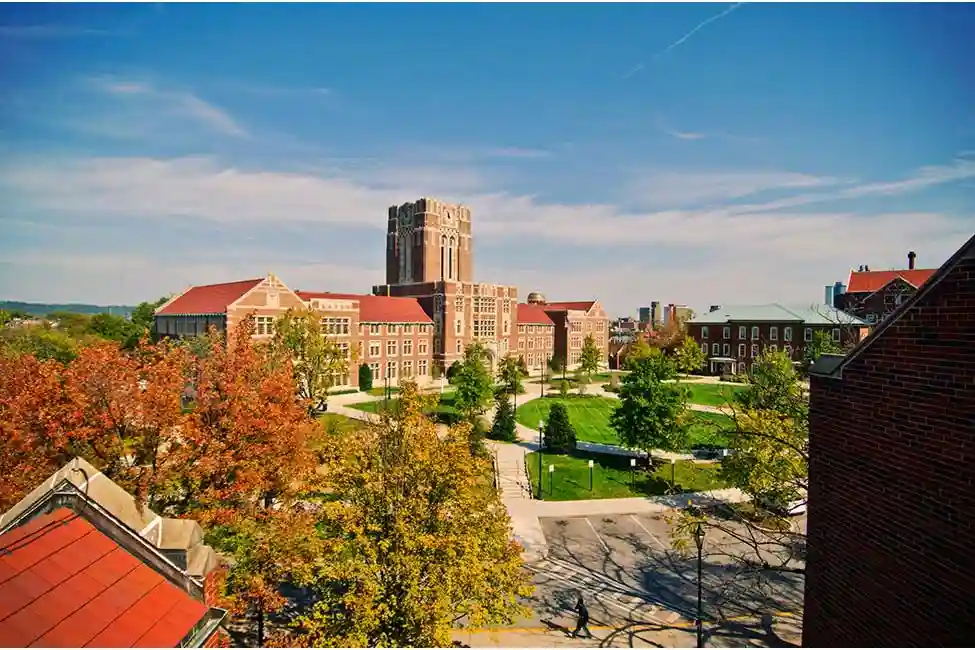
Study Education in the USA

Want to be matched with Education programs?
Let us know what you're looking for so we can find the best school for you.
The study of education, also known as educational studies or education sciences, is a multidisciplinary field that examines the theory, practice, and policies of education. It includes a broad range of academic disciplines, including psychology, sociology, philosophy, anthropology, history, and economics.
The study of education can encompass many different aspects of education, including teaching methods, learning theories, curriculum design, assessment and evaluation, educational policy, educational technology, and the social and cultural contexts in which education takes place.
Education researchers may study issues such as how students learn, how teachers can best facilitate learning, how educational policies impact student outcomes, and how to design effective educational programs that meet the needs of diverse learners.
The study of education is important because it helps to improve educational practices and policies by identifying effective teaching and learning strategies, evaluating educational programs and policies, and developing new ideas and approaches to education.

What does the study of Education consist of?
The study of education is a broad field that encompasses many different aspects of education. Some of the key areas of study within education include:
- Educational psychology: This field explores how people learn and how to create optimal learning environments. It examines topics such as cognition, motivation, and development.
- Curriculum design: This involves developing educational materials and resources for use in the classroom. Curriculum designers create lesson plans, textbooks, and other materials that help teachers convey information to students.
- Instructional methods: This area of study looks at different ways of teaching and learning, including traditional classroom instruction, online learning, and experiential learning.
- Assessment and evaluation: This involves measuring student progress and evaluating the effectiveness of educational programs and policies. Assessment and evaluation can help educators identify areas where students need additional support and where educational programs could be improved.
- Educational policy: This field focuses on the development and implementation of educational policies at the local, state, and national levels. Policy analysts examine the impact of policies on student outcomes and identify ways to improve them.
- Educational technology: This area of study explores how technology can be used to enhance teaching and learning. It includes topics such as online learning, educational games, and multimedia resources.
- Cultural and social contexts of education: This field examines the ways in which social and cultural factors influence education. It explores topics such as diversity, equity, and inclusion, and how schools can create inclusive learning environments that meet the needs of all students.
Overall, the study of education is a multifaceted field that encompasses many different disciplines and approaches. It seeks to improve educational outcomes by understanding how people learn, developing effective educational materials and methods, and creating policies that support student success.

What are the benefits of studying Education in the U.S.?
There are several benefits to studying education in the United States, including:
- High-quality education: The United States has a strong tradition of educational excellence, with many top-ranked universities offering programs in education. Studying education in the U.S. can provide access to world-class faculty and resources, as well as opportunities to conduct research and engage in fieldwork.
- Diverse learning environments: The U.S. is a diverse country with a rich history of immigration, and this diversity is reflected in its educational institutions. Studying education in the U.S. can provide exposure to different cultures, perspectives, and approaches to teaching and learning.
- Career opportunities: Education is a growing field, with increasing demand for teachers, administrators, and educational researchers. Studying education in the U.S. can provide access to a range of career opportunities, as well as opportunities to network with professionals in the field.
- Professional development: Education programs in the U.S. often offer opportunities for professional development, such as workshops, conferences, and internships. These experiences can help students develop skills and knowledge that will be valuable in their future careers.
- International perspective: Studying education in the U.S. can provide an international perspective on educational issues and practices. This can be valuable for students who plan to work in education in other countries or who are interested in global educational issues.
Overall, studying education in the U.S. can provide high-quality education, diverse learning environments, and access to career opportunities and professional development. It can also provide an international perspective on educational issues and practices, making it a valuable experience for students who are interested in education as a global field.
What colleges and universities in the U.S. have strong Education programs?
There are many colleges and universities in the United States that have strong education programs. Here are some examples:
- Harvard University: Harvard's Graduate School of Education is consistently ranked as one of the top education schools in the country. It offers a wide range of programs, including teacher education, educational leadership, and policy studies.
- Stanford University: Stanford's Graduate School of Education is another highly-ranked education school, with programs in areas such as learning sciences, teacher education, and policy analysis.
- University of Pennsylvania: The Graduate School of Education at the University of Pennsylvania is known for its research-oriented approach to education, with programs in areas such as education policy, quantitative methods, and urban education.
- University of Michigan: The School of Education at the University of Michigan is a top-ranked education school, with programs in areas such as teacher education, educational policy, and learning technologies.
- Teachers College, Columbia University: Teachers College is the oldest and largest graduate school of education in the United States. It offers a wide range of programs, including teacher education, educational psychology, and policy analysis.
- University of California, Los Angeles: The Graduate School of Education and Information Studies at UCLA is a highly-ranked education school, with programs in areas such as teacher education, urban schooling, and educational psychology.
- Vanderbilt University: Vanderbilt's Peabody College of Education and Human Development is known for its research-oriented approach to education, with programs in areas such as educational leadership, policy analysis, and learning sciences.
These are just a few examples of the many colleges and universities in the United States with strong education programs. Students interested in studying education should research programs at different institutions to find the one that best meets their needs and interests.
What community colleges have strong Education programs?
There are many community colleges in the United States that have strong education programs. Here are a few examples:
- Community College of Denver: The Community College of Denver offers an Associate of Arts degree in Elementary Education, as well as a certificate program in Early Childhood Education. The college's education programs are designed to prepare students for transfer to four-year institutions.
- Santa Fe College: Santa Fe College in Florida offers an Associate of Arts degree in Education, which provides a solid foundation in education theory and practice. The college also offers a variety of education-related courses and certificates.
- Cuyahoga Community College: Cuyahoga Community College in Ohio offers an Associate of Arts degree in Education, which is designed for students who plan to transfer to four-year institutions. The college also offers a certificate program in Early Childhood Education.
- Ivy Tech Community College: Ivy Tech Community College in Indiana offers an Associate of Science degree in Education, which provides a broad foundation in education theory and practice. The college also offers certificate programs in Early Childhood Education and Teacher Education.
- Salt Lake Community College: Salt Lake Community College in Utah offers an Associate of Science degree in Education, which is designed for students who plan to transfer to four-year institutions. The college also offers certificate programs in Early Childhood Education and Teacher Education.
These are just a few examples of the many community colleges in the United States with strong education programs. Students interested in studying education at the community college level should research programs at different institutions to find the one that best meets their needs and interests.
What kind of career opportunities will I have after studying Education in the U.S.?

Studying education in the U.S. can lead to a variety of career opportunities in the field of education. Here are some examples:
- Teacher: With a degree in education, you can become a teacher in K-12 schools. Depending on your area of specialization and the grade level you want to teach, you may need additional certification or licensing.
- Education administrator: Education administrators work in schools, colleges, and universities, overseeing academic programs and managing staff. Examples of education administrator positions include principal, superintendent, and dean.
- Curriculum developer: Curriculum developers create educational materials and programs, including textbooks, lesson plans, and online courses.
- Education policy analyst: Education policy analysts work in government agencies, think tanks, and advocacy organizations to develop and analyze education policies and initiatives.
- Education researcher: Education researchers conduct research on educational issues, including student learning, teacher effectiveness, and educational policy.
- Educational consultant: Educational consultants work with schools, districts, and other educational organizations to provide advice and support on issues such as curriculum development, teacher training, and program evaluation.
- Instructional designer: Instructional designers create educational materials and programs that incorporate technology and multimedia.
- Adult education instructor: Adult education instructors work in community colleges, vocational schools, and other adult education programs to teach adults new skills and knowledge.
These are just a few examples of the many career opportunities available to those who study education in the U.S. The specific career path you choose will depend on your interests, skills, and educational background.
Useful Articles
Check Out These Schools




Golden West College
Typical cost per Year: $5,000—$10,000

Truckee Meadows Community College
Typical cost per Semester: $5,000—$10,000

George Mason University
Typical cost per Semester: $35,000—$40,000



















